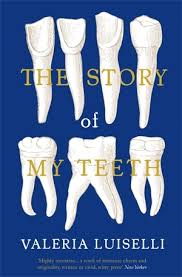Valeria Luiselli, The Story of My Teeth (2013)
Good Reads meta-data is 188 pages rated 3.49 by 9040 litizens.
Genre: Fiction.
DNA: Mexico.
Verdict: Humorous, creative, then tedious, and finally tiresome.
Tagline: A dental autobiography.
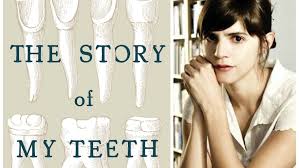
A discontinuous and disjoined narrative of Hero who was born with extra teeth and then by a convoluted story becomes fascinated by teeth, and not just his own. He becomes an auctioneer and that brings him into contact with teeth; teeth put up for auction. A tooth from Plato or Virginia Wolfe. And so on. Disbelief is suspended at the factory door.
Author was commissioned to write the text for corporate murals in a juice factory and in so doing, she asked workers about themselves, their work, and so on, and incorporated a lot of that in the pieces that constitute this book. (Or is that ‘comprise’? I have forgotten the rule that distinguishes them. Pedants, please enlighten me.)
The result is a series of short pieces threaded around Hero, barely. Each is well written but there is no momentum and I wasn’t sure why I should keep reading it. So I didn’t. Maturity, that is.
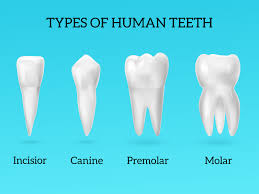
Well, I liked the reference to the horse’s teeth. You know the one. Yes, you do. In debating an obscure theological point of dogma, savants become vexed about the number of teeth a horse has. They argue from first principles, though of course, different first principles, on and on. Pages are filled with decretal (look it up) references, Biblical verses, Ex cathedra assumptions, and scholasticism logicism. Careers were made and broken on the wheel of peer review in this debate. At no time, do these magi consider examining a horse.
The story is often attributed to Francis Bacon, as it is in these pages, but a brief investigation of the internet suggests that there is no text to support that paternity claim. The most likely conclusion I found in the five-minutes of my own research is that it was concocted (by a journalist) in the early Twentieth Century who gave it authenticity with a fabricated pedigree by referring to an exact date, 1432, and the lustre of Sir Francis Bacon’s name. Accordingly, file it under the heading of ‘He never said it,’ along with many other commonly cited remarks.
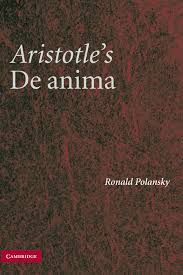
Aristotle often gets indicted for a similar dental lapse but of course…. It is more complicated when one bothers to consult his text of De Anima where he wrote ‘males have more teeth than females in the cases of men, sheep, goats, and swine….’ ‘Ah huh!’ I hear.
This observation is taken by some to denigrate women, though quite how is lost of me. Do women want to be in the company of sheep and swine along with men as a kind of identity? It is also cited as evidence that Aristotle was a fool for not counting teeth. He, the first and probably the greatest empiricist, did not count THE teeth! Indeed I have heard this trumpet sounded in more than one conference presentation on the circle of purgatory I occupied during my career. Well, let’s turn the pages of De Anima and we find there further comments that suggest he did count teeth, including women’s, in a story of a woman of eighty spawning wisdom teeth at that advanced age. What we might conclude from all this is that the woman or women he examined did have fewer teeth than the man or men he examined, and it being of incidental interest he left it at that. But of course, among you readers are various numbers of teeth due to congenital deformations, accidents, decay, violence, surgery, and age. Moreover, at different times of life we each have a different number of teeth. See complicated. Need it be said, yes of course, nothing is obvious to the purblind: the text of De Anima does not assert, state, imply or support the inference of masculine superiority because of dentures.
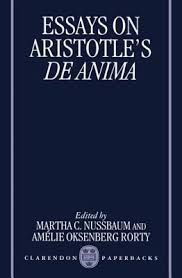
Moreover, none who mount the soapbox on this point themselves ever do any dental counting in sheep, swine, or women nor cite anyone else who has. That is a thesis topic in search of an author.
By the way, Bertrand Russell played a role in spreading and legitimating this furphy as he did others. Bertie was never one to check the original text when the muse inspired him, and he has become a secular saint whose word is law to be repeated but to be tested.

